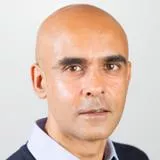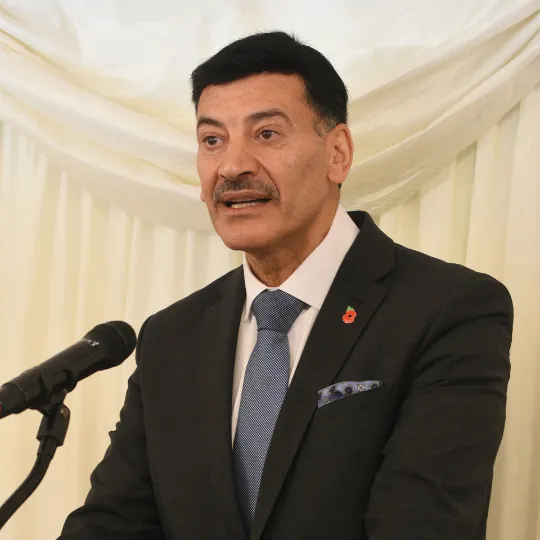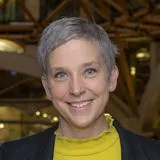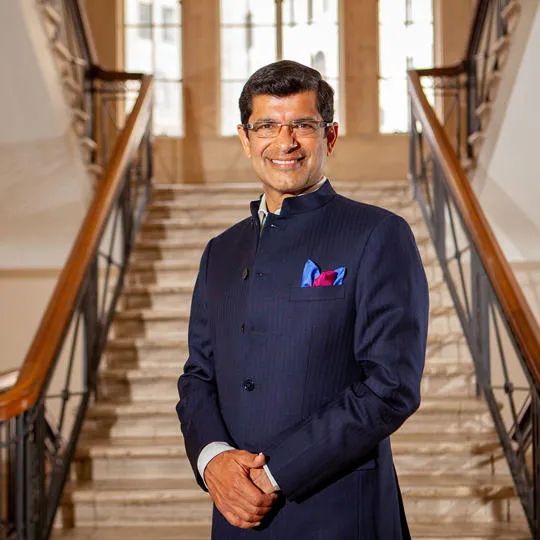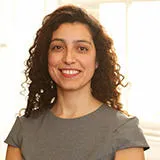Working with many colleagues within and outside King’s to prepare a diverse and engaging technical programme spanning a wide range of topics reflects the dedication and hard work invested by all involved. The Festival not only enhances King's reputation and standing in AI research but also emphasises our commitment to leveraging technology for the benefit of humanity, the environment, and the nation's prosperity.
Professor Bashir Al-Hashimi, Vice President (Research & Innovation), King’s College London
14 June 2024
Return of five-day Festival of Artificial Intelligence sees over 1500 people exploring AI at King's
Find out more about the King’s Festival of Artificial Intelligence held between 21 and 25 May 2024
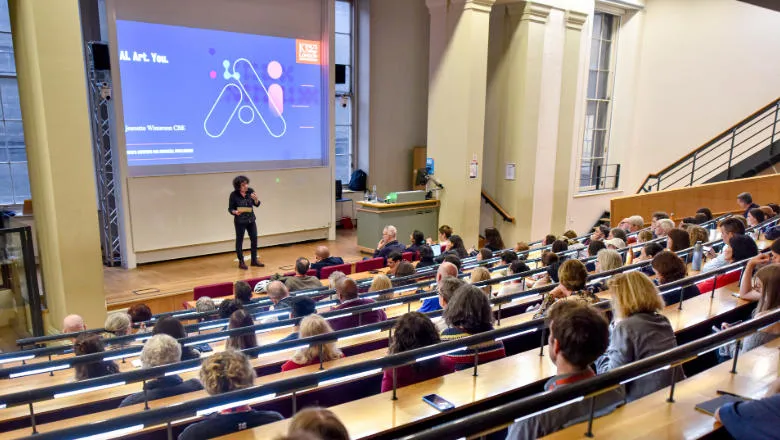
The much-anticipated King’s Festival of Artificial Intelligence returned between Tuesday 21 and Saturday 25 May, welcoming over 1500 people to Strand Campus to explore the latest advancements and discussions in AI at lectures, panel events, demonstrations, screenings, performances and more. Hosted by the King’s Institute for Artificial Intelligence, all events were open to the public and they covered an array of topics, including philosophy, social justice, healthcare, education, sustainability, responsibility, creativity, and intelligence itself.
Award-winning author Jeanette Winterson delivered a compelling keynote speech on the opening day of the Festival, exploring why AI needs the arts. She made a rallying call to the audience that AI ‘isn’t just for the tech bros and the closed AI conferences. It’s got to be something for all of us to understand and think about… this is your world, and you need to be part of it. For the many, not the few.’ This argument reflected one of the festival's key objectives: to bring new audiences into King's and invite them to learn from research developments in AI and contribute to the urgent questions raised by the developments in these technologies and their applications. Almost 60% of the 1500 festival attendees had no prior affiliation to King's and attendees praised the interactive and informative events, with one participant stating, ‘I participated in 4 events that day. They were all engaging and interesting, and I definitely learned something new from each one. Thank you for this opportunity and opening your doors to the public.’
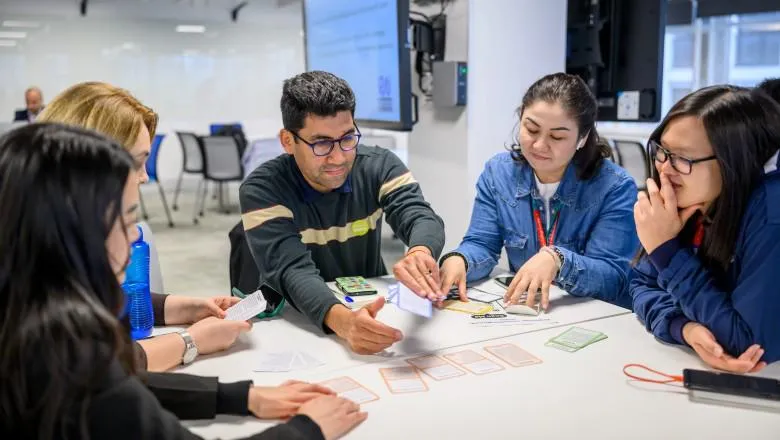
The festival programme brought together academics from across King's to deliver public keynote lectures. Professor Sylvie Delacroix from the Dickson Poon School of Law explored the role that participatory infrastructure can play in making the ‘AI revolution’ socially sustainable, Professor Oguz A. Acar from King’s Business School shared the ways Generative AI can reshape education, Professor Luca Viganò from the Faculty of Natural, Mathematical & Engineering Sciences outlined to a younger audience how fairy tales illustrate key concepts of AI and cybersecurity, Dr David Brydan from the Faculty of Arts & Humanities examined how understanding the history of intelligence can help us think about AI and its place in our world today, and Dr Sanjay Modgil from the Faculty of Natural, Mathematical & Engineering Sciences suggested answers to the question ‘Can, will and should machines be conscious?’.
External speakers from academia, arts, and beyond were also invited to take part in the conversations at the Festival of AI, showcasing the importance of having diverse voices and open discussions around AI and its impacts. Hosted in collaboration with BusinessLDN, a panel of industry experts, thought leaders and innovators sought to answer the question ‘Can London lead the way in AI?’, providing a lively discourse exploring the potential for London to become a global leader in AI innovation and implementation. Professor Lina Dencik from Goldsmiths, University of London offered her perspective on how AI influences our political landscape. Professor Leslie Carr of the University of Southampton and Ruby Carr performed their comedy show Carr Crash which asked ‘Is it easier to teach computers or teenagers to act like humans?’
There were a variety of opportunities for festival-goers to get hands-on experience with AI and the questions King’s researchers are asking. On the opening day of the Festival, seven groups of researchers from King’s and beyond showcased their work on topics as broad as autonomous service robots for the home, digital divination, AI art creation for mental health, finding blind-spots in AI, and how generative AI can ‘resurrect’ our deceased ancestors. PhD students from the UKRI Centre for Doctoral in Training in Safe and Trusted AI delivered a series of demonstrations, looking at uncertainty, the future of music, and video games. Commenting on their experience demonstrating ‘Super Mario Bros: The Turing Quest’ where the public were asked to guess if they were watching an AI or a human play Super Mario Bros, Nathan Schneider Gavenski, Michelle Nwachukwu and Jack Contro said: ‘Talking to a public that is not PhD students and King's academics is a great opportunity to expose ourselves to new ideas and gain different perspectives on our research.’ There was also a performance of AI-generated songs by Algorithmix, a band that included PhD students from the UKRI CDT in Safe and Trusted AI.
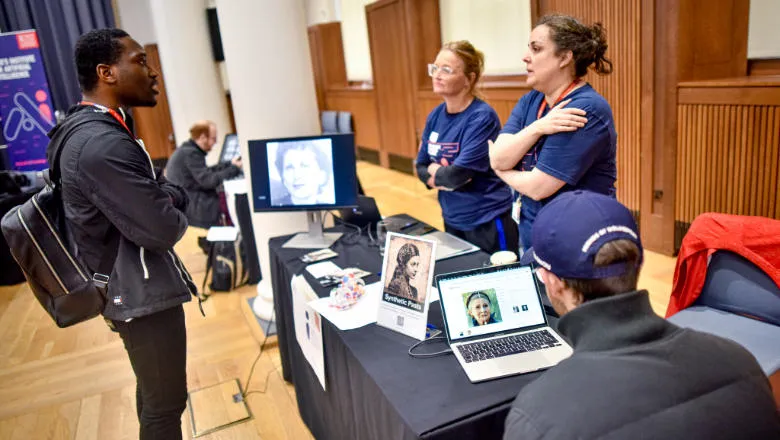
What does AI mean for staff and students at King’s? This question was explored by several events within the programme that addressed the potential for AI to personalize educational experiences, foster creative thinking, and develop critical AI literacy. Martin Compton convened a panel titled ‘AI in Higher Education: Tales from the Coalface’, in which colleagues from across the university discussed the challenges and opportunities of integrating AI into educational practices. Professor Oguz A. Acar delivered a keynote lecture on the ways Generative AI can shape education. There were also opportunities for academics to share the ways they use AI to improve the educational experience at King’s. Dr Kieran O'Halloran hosted an interactive workshop sharing innovative approaches deploying Generative AI for developing creative thinking, based on an undergraduate module he developed. Academics and students from the Faculty of Dentistry, Oral & Craniofacial Sciences and the Faculty of Natural, Mathematical & Engineering Sciences shared the co-creation process of AI-generated digital dental patients which have allowed for the personalisation of Dentistry education.
A sold-out Family Zone concluded the 2024 King’s Festival of AI. The Family Zone was a free, family-friendly exploration of AI, offering hands-on activities that captivated children aged four and over (and their parents and guardians). Children could learn how AI can be inspired by nature, how to use maths to make sure driverless cars are safe on the road, and how to build a robotic arm with King’s Robotics students. Activities also allowed children to try and design a pattern to trick AI face-detection systems, race against a driverless car in a session developed by student society KCL Tech, play board games and video games created by AI, contribute to building and training a simple AI programme via drawings of dogs, birds and fish, and learn more about chatbots and the ethical challenges involved. They could also design and build a sensational recycled robot model in a creative drop-in workshop run by workshop artist and designer Katie Kennedy.
The kids (7, 7 and 9) really enjoyed it and all got something different out of it.
Anonymous feedback from the Family Zone
For those who missed the festival or wish to revisit the events, recordings are available on the King’s Institute for Artificial Intelligence YouTube channel. Stay updated with future events and activities by signing up for the King’s Institute for Artificial Intelligence newsletter.
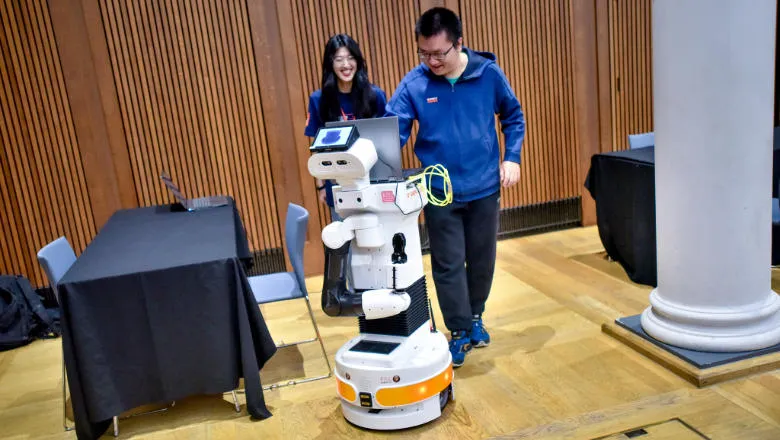
In this story
Related departments
- King’s Institute for Artificial Intelligence
- Faculty of Natural, Mathematical & Engineering Sciences
- The Dickson Poon School of Law
- Faculty of Arts & Humanities
- Faculty of Life Sciences & Medicine
- King’s Business School
- Institute of Psychiatry, Psychology & Neuroscience
- Faculty of Social Science & Public Policy
- Faculty of Dentistry, Oral & Craniofacial Sciences





